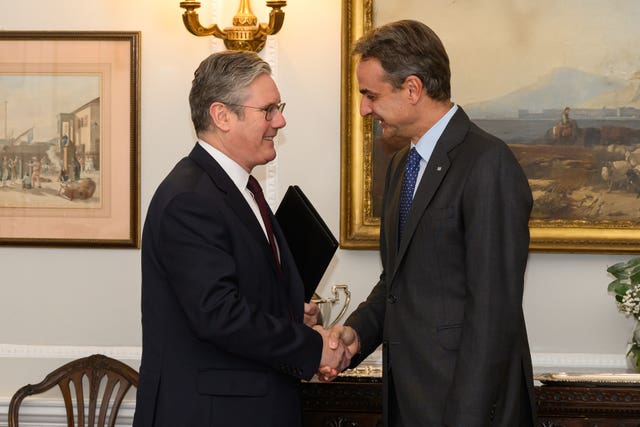Rishi Sunak has escalated a diplomatic row with Greece, accusing the country’s leader of trying to “grandstand” over the Elgin Marbles.
The Prime Minister cancelled a planned meeting with Kyriakos Mitsotakis following his Greek counterpart’s push for the Parthenon Sculptures to be returned from the British Museum to Athens.
Defending his actions in the Commons, Mr Sunak said: “It was clear that the purpose of the meeting was not to discuss substantive issues for the future, but rather to grandstand and relitigate issues of the past.”
At Prime Minister’s Questions, Sir Keir Starmer – who met Mr Mitsotakis during his visit to London – accused Mr Sunak of trying to “humiliate” the Greek premier.
The Labour leader accused the Tory leader of “small politics” over the row.
The Prime Minister told Sir Keir: “Of course, we’re always happy to discuss important topics of substance with our allies, like tackling illegal migration or indeed strengthening our security.
“But when it was clear that the purpose of the meeting was not to discuss substantive issues for the future, but rather to grandstand and relitigate issues of the past, it wasn’t appropriate.
“But furthermore, when specific commitments and specific assurances on that topic were made to this country, and then were broken, it may seem alien to him but my view is when people make commitments they should keep them.”
Downing Street has claimed it received assurances that Mr Mitsotakis would not publicly push for the return of the Elgin Marbles during his visit, but the Greek leader discussed the topic during a BBC interview ahead of the planned meeting with Mr Sunak.
There was no immediate response from Mr Mitsotakis to Mr Sunak’s Commons attack on his actions.
But a senior Greek official said: “In the spirit of the good, long-standing relations between the two countries, which we intend to preserve, we have nothing more to add on this matter.”
Greece’s foreign minister, Giorgos Gerapetritis, pushed for the sculptures to be returned to Athens at a summit also attended by Foreign Secretary Lord Cameron.
Nato’s foreign ministers gathered in Brussels, with former prime minister Lord Cameron and Mr Gerapetritis meeting on the margins of the summit.
Mr Gerapetritis said: “As regards my meeting with Secretary Cameron, once again I would like to say that the Greek government has made a statement concerning the cancellation of the meeting with Prime Minister Sunak.
“What I have to say is that the unification of the Parthenon Sculptures is a claim which is based not only on history, not only on justice, but it’s a claim of ecumenical cultural values.
“Irrespective of this, it is my understanding that we need to work on a bilateral basis with the UK and we’re going to serve this purpose in the future in order to deepen this long-standing history we have, the two nations.”

No 10 played down the significance of the talks, saying it was “not a bilat or a formal meeting” in any sense, but insisted Lord Cameron had “set out our position on the sculptures very clearly”.
Environment minister Mark Spencer said Mr Mitsotakis had made a “mistake” to voice the issue publicly.
Asked whether the UK-Greek relationship has been damaged, he told Sky News’s Politics Hub with Sophy Ridge: “I think it’s not been helped by the topic. And I think it was a mistake by the Greek prime minister to raise that so publicly as he did, but you know, we’re big enough to get over that and we’ll continue working with our friends in Greece.”
The Greek government has suggested Mr Sunak’s decision to scrap talks with the country’s leader was motivated by the Tories’ domestic political woes.
A spokesman for the Greek prime minister said there were “domestic reasons” for the cancellation of Tuesday’s meeting and pointed to Mr Sunak being “quite behind in the polls” ahead of a likely general election next year.
Downing Street denied the PM was insulting the leader of a Nato ally to distract from political turmoil over rising migration figures at home.
The sculptures once adorned the Parthenon at the Acropolis in Athens but were removed by British diplomat Lord Elgin in the early 19th century, while Athens was still under the rule of the Ottoman Empire and have been in the British Museum since 1816.
Athens wants them back, with Mr Mitsotakis claiming on Sunday morning that their removal was like cutting the Mona Lisa in half.
Asked why it then took until Monday to cancel the planned meeting, the Prime Minister’s official spokesman said: “There were discussions on Monday and then the meeting didn’t go ahead.”
There have been talks around a potential loan of the sculptures, but No 10 has insisted that Athens would have to accept they belong to the British Museum for that to even be an option.
Meanwhile, Commons Speaker Sir Lindsay Hoyle hosted Greek ambassador Yannis Tsaousis in Parliament on Wednesday.
Aides said it was a long-planned visit as part of the Speaker’s regular meetings with diplomats.




Comments: Our rules
We want our comments to be a lively and valuable part of our community - a place where readers can debate and engage with the most important local issues. The ability to comment on our stories is a privilege, not a right, however, and that privilege may be withdrawn if it is abused or misused.
Please report any comments that break our rules.
Read the rules hereLast Updated:
Report this comment Cancel